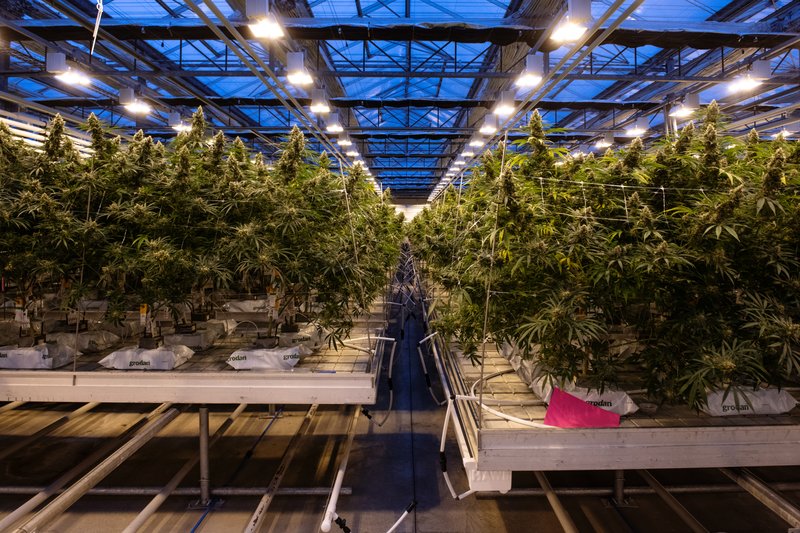OTTAWA, Canada -- Canada becomes the first major industrialized country to fully decriminalize cannabis for recreational use today, fulfilling a 2015 election pledge from Prime Minister Justin Trudeau in a process that has proved complex and remains fraught with uncertainty.
Concerns abound. Already there are worries about a shortage of legal cannabis for sale in the early months of legalization and a lack of retail outlets, leading to a possible boom in the illicit marijuana trade the new law is designed to thwart. Canada's 13 provinces and territories must regulate the distribution and sale of cannabis, and they are adopting a range of differing approaches. And Canadians crossing into the United States might be barred entry if they admit to using cannabis.
Under legislation passed by Canada's Parliament in June, it will no longer be illegal for adults to purchase, possess or grow recreational cannabis, starting today. It is a far broader legalization process than what's taken place so far in the United States, where nine states and the District of Columbia have legalized recreational pot but federal law still treats it as an illegal Schedule 1 substance.
Late Tuesday, a senior government official said anyone with a pot possession record of 30 grams or less will be allowed to apply for a pardon. The official was not authorized to speak publicly ahead of today's announcement and spoke on condition of anonymity.
While Canada's federal government has changed the country's criminal law and is now responsible for licensing commercial cannabis growers and authorizing their products, the provinces are in charge of regulating distribution and retail sale of marijuana.
In Ontario and the western provinces, sale of cannabis will be left largely to licensed privately operated retail outlets, but in Quebec and most eastern Canadian provinces, marijuana will be sold only in state-run stores, in the same way alcohol is sold. In most of the country, the legal age will be 18 or 19, the same as for alcohol, but Quebec has promised to boost the cannabis consumption age to 21.
In Ontario, the most populous province, the only way to buy legal pot as of today will be by mail-order because permits for private outlets are not expected to be issued before next spring after recently elected premier Doug Ford decided to reverse earlier plans to sell cannabis through government-owned stores.
In neighboring Quebec, there will be a dozen outlets open while in British Columbia, there will be just a single provincial store, although it is expected that cannabis will still be available in privately owned storefronts where sales have long been tolerated.
Federal law also will allow adults to grow four plants apiece for personal consumption, extending an existing rule for legal users of medical marijuana, but Quebec and Manitoba intend to ban personal growing outright. And foods containing cannabis, like cookies and candies, will remain illegal for the next year until the Canadian government completes its regulatory system for edibles. In the meantime, they are apparently easily available through illicit sources.
Several provinces have already complained that producers have shipped less marijuana than anticipated, which could lead to shortages.
Vic Neufeld, chief executive of Aprhia Inc., one of the top producers, told investors last week that he expects shortages to occur for two or three months until production increases and there is better understanding of consumer demand.
"It's like trying to merge a five-lane highway into a one-lane country road," he said. "It's tough to get everything through the bottleneck on a timely basis."
The anticipated shortage of cannabis through formal retail outlets could be a major boost for black market providers, according to Anindya Sen, an economics professor at University of Waterloo. He notes that many of these suppliers already use websites, apps and even home delivery for their offerings.
Despite the hiccups, Sen said he believes Canada has an opportunity to take a leading role in an emerging industry. "A lot of European countries will be looking at what is happening here," he said. "If Canada gets it right, it could be a world leader" in creating systems to produce and process commercial amounts of cannabis.
For Canadians crossing the border into the United States, the situation remains risky for anybody who uses cannabis, even after the law changes. "Anybody who admits to having violated the law relating to a controlled substance is inadmissible to the U.S.," according to U.S. Customs and Border Protection.
U.S. citizens have no such risks because U.S. officials cannot legally bar a citizen from entering the country, said Len Saunders, an immigration lawyer in Washington.
Information for this article was contributed by Rob Gillies and Gene Johnson of The Associated Press.
RELATED ARTICLE
https://www.arkansa…">Scoring plan for pot firms outlined
A Section on 10/17/2018
